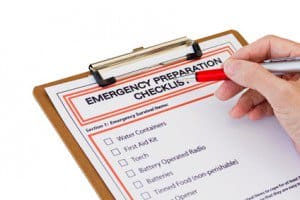
Prepare yourself with an emergency prep checklist in case of a natural disaster
Being prepared in the event of a natural disaster is important for everyone. However, the American Association of Retired Persons (AARP) stresses that it is especially important for older Americans to have plans in place, and reassess them at regular intervals to make sure they are in line with their current needs and capabilities. If you currently do not have a disaster preparedness plan, the AARP has provided some tips to get you started.
First, you should identify exactly what it is you are preparing for. Consider the types of natural disasters which occur where you live. Does your area experience floods, drought, hurricanes, tornadoes, earthquakes, blizzards, and/or lengthy heat waves? You might prepare slightly differently for each.
Next, click here to visit the Federal Emergency Management Agency (FEMA) website, where you can print a Family Emergency Plan form. Complete the form with the important identifying and medical information of everyone in your household, and place it with your emergency kit.
One of the most important aspects of disaster preparedness is making sure you have the appropriate supplies on hand. The FEMA website offers a list of that will help you to get started. The following are examples of crucial items you will need in an emergency.
- Enough water and perishable food to last each person in the house for three days.
- Enough spare clothing for one week.
- Personal hygiene products.
- Enough of each of your medications to last for one week.
- A spare pair of eyeglasses.
- A spare hearing aid with extra batteries.
- Food for any pets you may have.
- Paper copies of your birth certificates, insurance policies, medical cards, bank/credit card information, and your last will and testaments.
Finally, you will have to consider what will happen if the nature of the disaster is such that you cannot remain in your home. In this case, you should first consider transportation. If you are still driving, you will need to make sure you have spare gasoline on hand. If you are not, you should have the names and phone numbers of people who can assist you with vacating your home within easy reach, and consider if you need to give one or more of those people keys to your house. Be aware of your nearest emergency shelter, as well as designated evacuation routes. If you have pets, make sure you have the proper cages or carriers to transport them safely.


